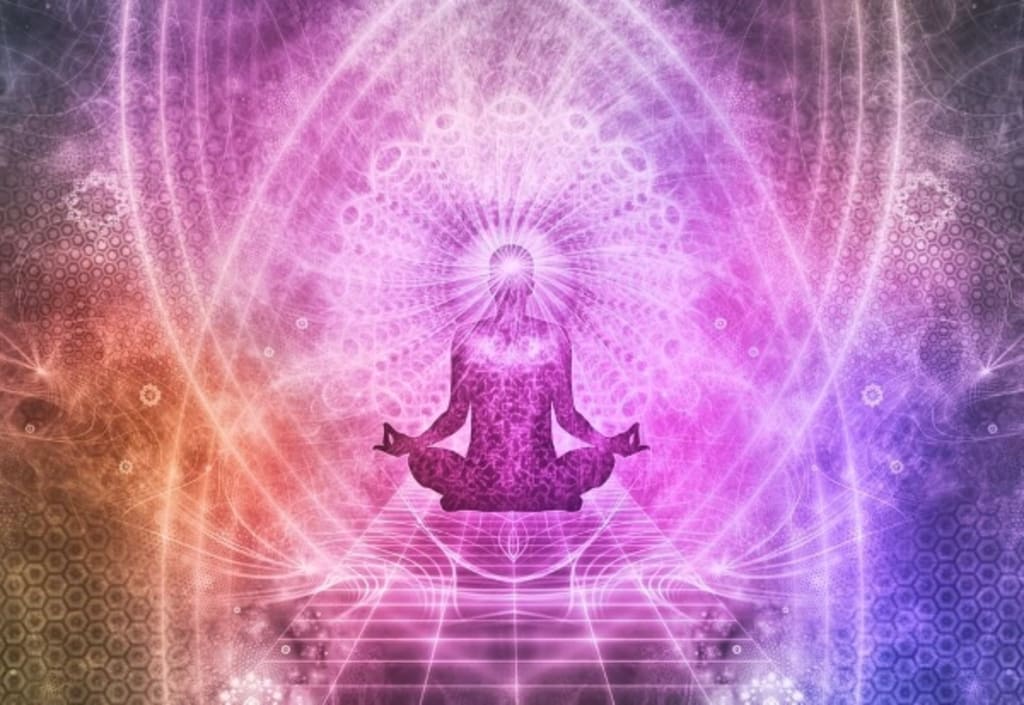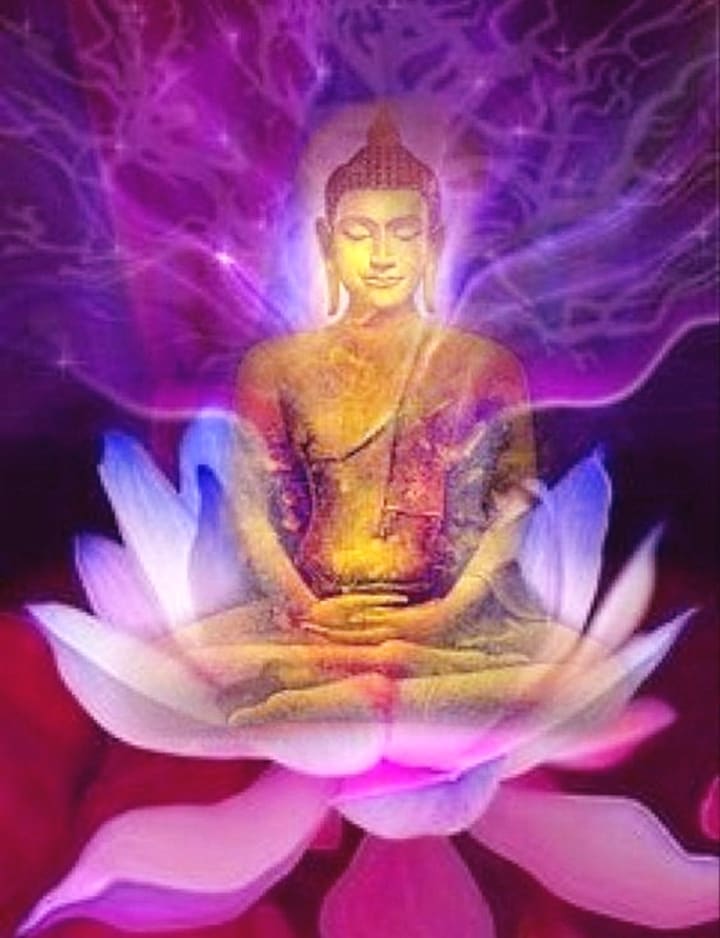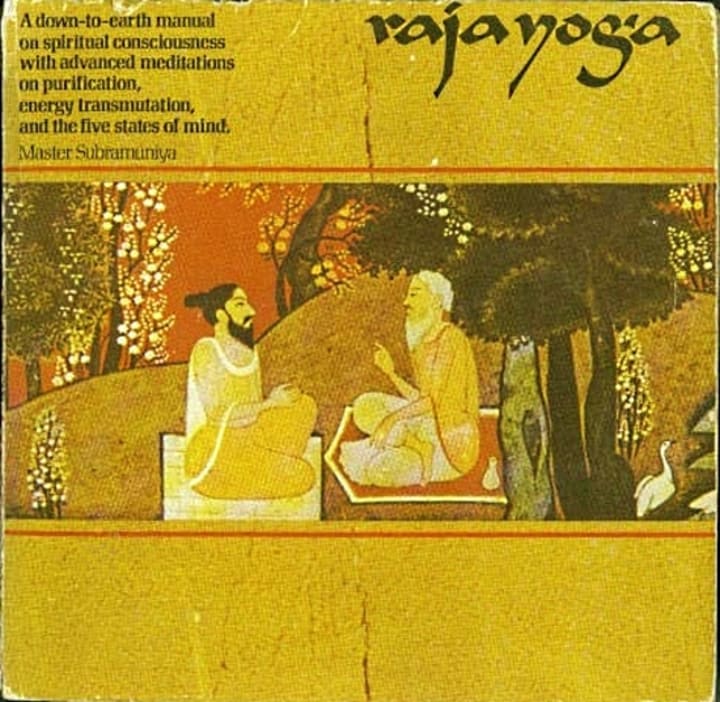
In some ways, these terms are simple, in some ways complicated. They are more than words, and we have to be born into, grow with, and experience certain concepts in order to fully understand them.
Introduction
As a forethought, the terms "nirvana" and "heaven" are often seen capitalized in certain usages. I have chosen to keep these terms in non-capital form, so as to treat them in a purely objective manner. No offense is intended, and I hope none is taken.
More commonly, the Christian and the Jew are versed in the discourses of heaven. Since Judaism and Christianity are somewhat removed from each other and since there are several denominations that ascribe to Christianity, there are several perspectives of heaven, several definitions, more than one perceived way to get there (depending on whom you talk to), and a myriad of obstructions that get in our way.
The Hindu, the Buddhist, and the Jain are the ones more knowledgeable about nirvana. And here again, we have believers of different castes and cultures and, therefore, different perspectives and concepts.
We are all familiar with the word "enlightenment." But what it means in the simple linguistic derivative and what it alludes to in the historical pages, and then again, what it signifies in the Eastern mystical practices are quite different denotations altogether.
Are these concepts really all that different? Are there any similarities worth exploring? Is there a point of understanding where these ideas come together to cement a singular course of scrutiny? We should keep in mind that where differences exist, there is always the potential for conflict. And conflict is best resolved by finding factors of commonality.
So, I will attempt to define, to explain, and to "enlighten" the reader as to the differences and the similarities of these concepts.
Enlightenment

Lao Tzu
The most basic definition for "enlightenment" is "the state of being free from ignorance and misinformation." A deeper and more engaging meaning of it can be found in Buddhism, where "enlightenment" is "a final blessed state marked by the absence of desire and suffering."
The word "enlightenment" is also associated with The Age of Reason that occurred in Western Europe in the 17th and 18th centuries, developed from a rational inquiry from the Scientific Revolution and from political theorists… a concept in which all things could be understood or explained through reason. This movement questioned much of what was taken for granted on several fronts, including social norms and religion, and often clashed with the views of the Church.
Other sources associate "enlightenment" with "a full comprehension of a situation," as well as "liberation, illumination, and religious or spiritual insight." In Zen, it is "seeing into one’s true nature." In Buddhism, it is "awakening or understanding"—an ultimate goal attained when all limitations have been removed from the mind and one’s positive potential has been completely realized, a state marked by infinite compassion, wisdom, and skill.
In Hinduism, "enlightenment" is known as "moksha" or "mukti," which mean "release, let loose, or let go" and refers to the final extrication of the soul or consciousness and the cessation of suffering that results from repeated death and rebirth (reincarnation).
The meditative exercise of yoga, different from that which immerses one in contemplation, deals with the withdrawal from the particular (or separateness) and identification with the Universal Consciousness, and that state is known as "enlightenment."
“Knowing others is wisdom; knowing yourself is enlightenment.” ~ Lao Tzu
Nirvana

Thich Nhat Hanh
The word "nirvana" comes from Sanskrit and literally means "the act of extinguishing," one part pertaining to "out" and the other pertaining to "blow," more closely being associated with "wind."
The dictionary defines nirvana as: "the final beatitude that transcends suffering, karma, and samsara (the indefinitely repeated cycles of birth, misery, and death, as caused by karma), sought by some (usually Buddhists) through the extinction of desire and individual consciousness; a place or state of being oblivious to care, pain, or external reality; a goal hoped for but apparently unattainable; bliss, heaven, and more loosely, dream."
The more simplistic encyclopedic reference describes nirvana as: "the conception of salvation from rebirth in the religions of ancient India—Hinduism, Buddhism, and Jainism; to Hindus, extinction of self in the supreme being, brought about by internal happiness, internal satisfaction, and internal illumination; to Buddhists, attainment of enlightenment by a transcendent through the extinction of all desires; to Jainists, a state of eternal blissful repose."
A third source of Tibetan Buddhism origin says this:
The 4 Noble Truths
- All things are transient—as soon as they come into being, they are ceasing to be.
- Seeking something permanent in view of this leads inevitably to anguish and dissatisfaction that arises from never finding it.
- To understand this, to see things as they are, no longer disturbed or affected by this, to be but to remain unaffected by our perception of this truth is to enter into the condition of nirvana.
- Seeing and understanding these truths enables us unto the 8-step path that leads to the final conditional state of enlightenment.
"When you get free from views and words, reality reveals itself to you, and that is nirvana.” ~ Thich Nhat Hanh
Heaven

The first dictionary definition of heaven is: "the expanse of space that seems to be over the earth like a dome." When it is capitalized, heaven is "the dwelling place of the Deity and the joyful abode of the blessed dead." It is defined also as "a spiritual state of everlasting communication with God," and "a place or condition of utmost happiness." And Christian Science makes a further distinction as "a state of thought in which sin is absent and the harmony of the divine Mind is manifest."
The encyclopedic description of heaven begins with: "an abode of divine beings" or a "world of bliss beyond death." After the 3rd or 2nd century BC, there developed a Jewish tradition of seeing heaven as the dwelling place of God and the angels, and of those human beings who had died after leading a virtuous life. Christian theology adopted this concept but modified it to be the destination of the true followers of Jesus Christ.
Other sources have heaven as: "the heavens" or "the seven heavens"—a common religious, cosmological, or transcendental place where heavenly beings such as gods, angels, jinn (the root of "genie"), saints, or venerated ancestors are said to originate, to be enthroned, or simply to live. It is believed by different schools that heavenly beings can descend to earth and/or incarnate and that earthly beings can ascend to heaven in the afterlife or, in exceptional cases, enter heaven alive.
Heaven is often described as a "higher place, the holiest place, and a paradise," in contrast to hell, the underworld, or the "low places." It is universally or conditionally accessible by earthly beings, according to the various standards of divinity, goodness, piety, faith, or other virtues or right beliefs, or simply the will of God.
In Hinduism cosmology, there are seven heavens, and the soul is subjected to rebirth until it has transcended through the highest of these states or nirvana.
In the faith of Ancient Egypt, heaven was a physical place beyond the universe, and souls would undertake a literal journey to get there, facing hazards and entities that would try to prevent their endeavor, with one’s success determined by the account of one’s sins.
Of interest is an ancient concept that places heaven in or equates it with the sky. Long before Moses, people observed that the remains (ashes) of their cremated deceased would rise and disperse into the sky. And those that held that the spirits of the dead went to be rejoined with their creator came to believe that the creator resided somewhere up there, in the unseeable regions hidden by the clouds.
Many people, rulers who saw themselves as god-like and those that had to bend to their persuasion, had themselves interred, believed their journey continued from there, and came to see the opposite of the "creationists’ heaven" as a macrocosm below the ground, within the bowels of the earth.
And this may be why the latter concept of "hell" came to be perceived as an "underworld" or a "nether world"—the consequential destiny of those who deny or oppose the Spiritual Creator God. Initially, it might not have been viewed as such a terrible place. But in time, since it was a place lacking of God’s presence, it came to be seen as completely opposite of what heaven was believed to be.
Why is hell mostly perceived as a morass of flames and reeking of sulfurous fumes? Probably because this is what has been seen spewing from out of the earth. Might not it be more conceivable that hell is a cold, dark, and isolated environment? And more simplistically, hell could be defined as any place, physical or ethereal, where one’s God is not present.
“A little faith will bring your soul to heaven; a lot of faith will bring heaven to your soul.” ~ Author Unknown
Inferences

Gautama Buddha
The main difference, and I emphasize "main," between nirvana and enlightenment is the linguistic origin. Nirvana is essentially Sanskrit, whereas enlightenment is a derivation from the word "light," which begins with the Old High German, leading into the Old English, and then into the Middle English, with probable ties to Latin and Greek. Contemporarily, "enlightenment" is an English word.
This derivation alludes to the analogy of "being in the dark" and then receiving revelation that brings one into a state of clarity. In a simplistic comparison, it could be said that nirvana and enlightenment are the same thing, but that would be a simplistic comparison. Nirvana’s definition depends greatly on the ascription of the one being asked—Hindu, Buddhist, or Jain.
Referring back to the modern day sage, Thich Nhat Hanh… when we get free from views and words, from images and thoughts, from purpose and process… when we erase the activity of the mind and the sense of being, we transcend into that state many refer to as meditation, trance-like and profound. The sense of illumination that results from this is nirvana—a state of being that many view as being on the fringes of heaven.
If we choose instead to ponder the complexity of life, the immensity of the universe, the probabilities and the possibilities, truth and beauty… if we immerse ourselves in the examination of the how’s and the why’s, the connectedness and the reliance of things on one another, we ascend from the intellect into the intuitive, from understanding into knowing. This transformation fills us with spiritual wellbeing, with serenity, and freedom from self-doubt and uncertainty. This is enlightenment—a state of mind that brings one to the margins of true meditation.
The difference—and again, it is the "main" difference—between these states of mind or being and heaven is that this latter, conventionally and commonly, is thought of as a place. There are other places found in mythology that could be compared to heaven. One is Olympus, from the Greek and Roman mythologies. It was the home of the gods, and it was closed to mortal eyes. Another, from the same schools of concept, is Elysium, comparable to the Western perceptions of Eden or Paradise, where mortals are allowed. And another still would be Asgard, from the Norse mythology, which, by description, is somewhat difficult to understand. The contrast here is that in the pre-existing mythologies, God was not One but rather a committee (or clan) of gods with different powers or influences over the various components or elements of the earth.
"Believe nothing, no matter where you read it, or who said it, no matter if I have said it, unless it agrees with your own reason and your own common sense." ~ Gautama Buddha
Experiential Perceptions

Master Subramuniya
I grew up with a Christian influence, specifically Catholic. My first observation about religion was that we (my family and I) did not often go to any church services. My second observation, when I became more adherent to the institution, was that we (those of us in catechism) were told what to believe. And when something didn’t make sense, it was simply attributed to the infallible insight of the Church or to the miraculous power of God, both of which are depicted as enigmatic.
As I grew older, I continued to see that the general information that was the source of our beliefs was presented to us much in the same way as our world history or our basic science, except that much of what was supposed to be factual information was based on belief.
Everything came from one book, and everything in that book is supposed to be unquestionable truth. At one point, I became familiar with the phrase "God-fearing Christian," which is not in the book. My impression, at the time, was that one follows God’s laws or one goes to hell. But God’s laws, as presented in the Old Testament, are severe even beyond medieval… and no one that I knew then or now actually lives completely according to what is written there.
In the New Testament, Jesus came along and, although He claimed that He did not come to change "the Law," somehow, a great deal did change. Some people say that they take everything in the Bible literally, but in reality, they do not always. For the most part, they take literally what is convenient, and they base interpretations on the trends of modern developments.
As a young man, I became interested in yoga, which led to an interest in the Eastern philosophies and religions. Here, I learned through the works of other sages how to see God in a very different way.
The ways of the Orient do not tell one what to believe nor do they impose upon one the beliefs of others. Axioms are often shared, but it is usually left up to the individual to interpret their meaning and to accept or reject their merit.
In the introduction section of the book Raja Yoga, the Reverent Master Subramuniya writes, “… After you have read and reread it… take the book apart and try to disprove to yourself everything you have read. Do this, and you will do much for yourself.”
In the Oriental systems, one is taught how to restrain one’s thought processes, so that an internal awareness is discovered, and that awareness unveils a distinct clarity that has always been there, obscured by one’s thoughts and beliefs. The emergence of this discovery and clarity is the "enlightenment" about which I have been narrating.
Initially, one goes in and out of these episodes of discovery. The process of restraining movement and thought is a practice, and repetition makes the process smoother and more expedient.
Eventually, there may come a time when that inner awareness and clarity becomes constant. One no longer practices to go into a state of mind but rather to remain in a state of being. When one has attained that state of being where one is no longer making an effort in pursuing enlightenment but rather allowing the illumination to manifest itself effortlessly, one is said to have reached the plateau of nirvana. And, in contemporary linguistics, such a one is called an "enlightened one."
And then, there is heaven… commonly known as the place to which our souls go when our bodies die... and that is, assuming we’ve earned that privilege. To be in heaven means that one is in the company of the Creator. But there is a catch here.
Most establishments of theology teach us that we are all endowed with God’s grace, and this grace is everyone’s ticket into heaven. So, whether or not everyone goes to heaven, and whether or not anyone actually gets sent to hell remains a subject of ongoing debate.
In most of my discussions about God and heaven, I have tried to emphasize one thing—what it is that invokes the mystique, the obscurity that makes these subjects difficult to comprehend. And once we understand that factor, we can more easily understand the subjects. First and foremost, God is a spiritual entity. I usually prefer to refer to God as the Great Creator Spirit or variations thereof.
Being of a spiritual nature makes an entity unconventional, and therefore, it cannot be defined, described, or explained with conventional terms. To say that It is a spirit doesn’t really say much. A bottle of whiskey has a spirit. And so it is with the concept of heaven.
I have distinguished it here by saying it is a place… but, of course, it is not a place in the conventional sense. We cannot walk there, or ride a car there, or a boat, or a train, or a plane, or even a rocket. Heaven does not exist in the 3-dimensional universe. Nor is it even a realm of dimensions, as we understand them.
By viewing heaven and hell as otherworldly dominions, we might infer that angels and demons are extra-terrestrial. Obviously, they are not earth-born. And this inference might in turn raise some new speculations about the extra-terrestrial aliens that people sometimes claim to have seen.
Is our Creator Spirit then also extra-terrestrial? One of the attributes given to God is omni-presence, meaning that He is everywhere all at once. The place that we call heaven, however we might imagine it, is an unnatural, ethereal, astral, non-physical, non-material, non-corporeal universe where a reunification will occur—meaning that the stage of our being, which we’ve come to understand as our soul, will be taken back into the source from which it was conceived.
I will contribute two further points of contention about this. It is part of the philosophy within Tibetan Buddhism and some of its offshoots that when an "enlightened one" sheds the body (dies), one will transcend the first tiers in one’s flight through the heavens, and then may decide to return and help others find their way, giving up one’s option of being in the company of the Highest Consciousness.
However, the other point is that those who have become enlightened and who have attained nirvana have reached an awareness of inner being, an awareness of the soul, that facilitates the temporary release of that soul so that it may move about outside of the boundaries of the physical body, what some call "the out-of-body experience." This metaphysical being is perfectly capable of transcending the various planes of existence, the parallel universes as it were, and it may conceivably visit the fringes of the empyrean region known as heaven. This sojourn has its limits, of course, and one must always return to the physical body until one is called into the Eternal Reunification by the Supreme Being.
“The intellect is the greatest barrier to enlightenment.” ~ Master Subramuniya
A Parting Note

Raja Yoga
Master Sivaya Subramuniyaswami, also known as Gurudeva by his followers, and more commonly as Master Subramuniya or the Western Guru, was born in Oakland, California and raised on the shores of Fallen Leaf Lake near Lake Tahoe. He is credited for bringing the essentials of Hinduism into the Western consciousness, first through his writings and teachings and then by establishing the Wailua University of Contemplative Arts in Hawaii, sometime in the 50s. He was one of my life changers, giving me the words that embarked me on the journey of enlightenment.
Raja Yoga was first published in 1958, with several printings thereafter. I treasure my copy and protect it carefully. If you should ever happen upon a copy, I advise you to acquire it and read it and keep it safe. It will teach you many things. It is hard to find, and I don’t think it is being printed anymore.
r. nuñez, 3/2016
About the Creator
r. nuñez
I am a shamanic priest who loves to write stories, poetry, and songs. Retired, but still helping people, animals, and the planet.






Comments
There are no comments for this story
Be the first to respond and start the conversation.